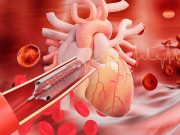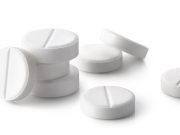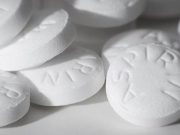Tag: Aspirin
Aspirin Linked to Lower CRC Recurrence for Molecularly Defined Subgroup
Significantly lower incidence of colorectal cancer recurrence seen for patients with somatic alterations in PI3K pathway genes
USPSTF Guidelines of Little Value for Estimating Preeclampsia Risk in Those at Moderate Risk
23.8 and 50.4 percent of those with one and two or more moderate risk factors were recommended aspirin prophylaxis
Almost 15 Percent of U.S. Seniors Use Aspirin for Primary Prevention
22.7 percent of primary prevention aspirin users started aspirin without a physician's recommendation
P2Y12 Inhibitor Monotherapy Beneficial for Patients Who Undergo PCI
Risk for major adverse cardiac and cerebrovascular events lower compared with aspirin monotherapy for patients who undergo PCI and discontinue DAPT
Bleeding Risks for Oral Anticoagulants and Aspirin Mostly Similar
Similar risks seen for apixaban and dabigatran versus aspirin, while rates were higher for rivaroxaban
Daily, Long-Term Aspirin Use Reduces Colorectal Cancer Recurrence
Findings seen for patients with somatic alterations in the PI3K signaling pathway
Primary Prevention Aspirin Use Decreased After Recommendation Change
Decrease in use seen among older adults, adults with low ASCVD risk, but also among those with higher ASCVD risk
Aspirin-Linked Reduction in CRC Risk Varies With Lifestyle Score
Greater absolute risk reduction seen in those with less healthy lifestyles
Medically Advised Aspirin Use Lower in 2021 Than 2012 to 2017
29.7 percent of those aged 60 years or older reported primary prevention use in 2021, with 5.2 percent using without medical advice
Aspirin Provides No Benefit for Breast Cancer Recurrence, Survival
Findings seen among people with high-risk nonmetastatic breast cancer at a median 33.8 months














